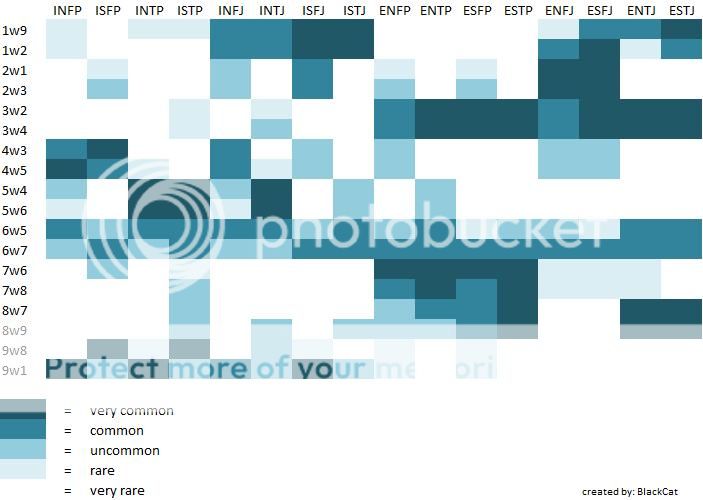Ok, so I saw this data on PersonalityCafe a few weeks ago, regarding the MBTI/enneagram types of all their members (each member apparently has the ability to pull the data on all the members as a whole regarding their "About Me" sections in their profiles [i.e., MBTI type, enneagram type, etc.]), and thought that, while their charts were pretty good, I could probably make em better (please excuse the INTJ). So, in light of the effort in this thread, I decided to go and do it, so we could compare [MENTION=5627]BlackCat[/MENTION]'s opinions about MBTI-Enneagram correlations against the empirical data from PersonalityCafe. Now, I remind you, this data is based on what 14,000 members put in their profiles, with about 30% leaving their enneagram type blank and 10% leaving their MBTI type blank. Obviously, some people will be unintentionally mistyped, in one or even both systems, and some people may have intentionally mistyped. But with 14,000 members, and 90% including their MBTI, and 70% including their enneagram type, I think the data is at least worth looking at. It certainly isn't perfect, but almost no study ever is, and, if we make the assumption that the 30% of people who left their enneagram types blank would have their enneagram types be distributed in roughly the same manner as the 70% who included them (and this assumption isn't too heinous), then, aside from mistypes, and the fact that people of certain MBTI type-Enneagram type combinations might have a greater or lesser propensity for joining a personality forum, the data would be clean.
So, with all that being said, here's Blackcat's data again:

And here's their data:

Obviously, their data doesn't take into account wings, but we can still gather meaningful observations by comparing the two.
[will be including my observations here]
In their data ENFJs are correlated with 9<4=6<3=7<2. As Blackcat argued, ENFJ 8s are very rare (~1% in their data), but, as others argued, ENFJ 9s are more common than previously thought (~6%). Their data also predicts more ENFJ 7s than in Blackcat's opinion (BlackCat figured they'd be rare, but their data has them tied for the second most common), and fewer enneagram 1s.
In their data, ESFJs are correlated with 1<9<3=4<6<2. Their data have fewer ones, more 9s, fewer 3s, and more 4s than Blackcat's opinions would imply. These are interesting and rather significant deviations from Blackcat's opinion, moreso than for most of the other types. It should be noted that ESFJs, despite their significant makeup of the general population, are the least represented MBTI type on the forum (they only make up ~0.6% of the forum [vs __% in the general population]), so this data, which includes only ~90 ESTJs, may not be a large enough sample to create a representative distribution.
In their data, ENTJs are correlated with 1<6<3<8, which is roughly what Blackcat's opinions would imply.
In their data, ESTJs are correlated with enneagrams 8<1<6<3, which are the same four most common types as predicted by Blackcat, but there are fewer ESTJ 8s in their data than in Blackcat's opinion. Perhaps, once again, enneagram 8s (and particularly sensor 8s) just don't join personality forums as frequently? I somewhat doubt it has to do with ESTJ 8s being disproportionately in the "unknown" pile. Also, ftr, despite their significant makeup of the general population, ESTJs are one of the two least represented MBTI types on the forum (second only to ESFJs [each make up ~0.6% of the forum {vs __% and __%, respectively, in the general population}]), so this data, which includes ~90 ESTJs, may not be a large enough sample to create a representative distribution.
Very nice.
Yeah, I agree.
There definitely doesn't seem to be any consensus theory as to why people have the enneagram type they do, but the child's relationship to its parents seems to be one of the more prominent and sensible ones out there.
Yes. Personally I tend toward the notion that psychological type is the/a nature/hardwiring component, and enneagram is the result of the nurture/hardwiring component interacting with said nature/environment/dynamic component. This would explain why certain enneagrams are more common among certain types given one’s nature/leaning will affect response to the nurture component, while still allowing for variance in result due to wildly different development scenarios.
Parenthetically, I tend to lean on the side of nature/hardwiring for instinctual stackings as well, although open to conjecture on that.

